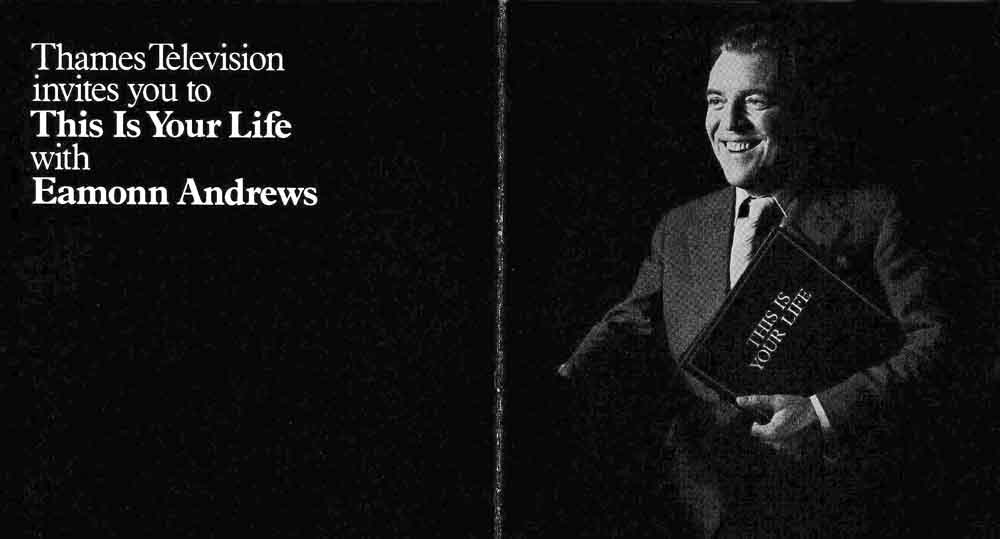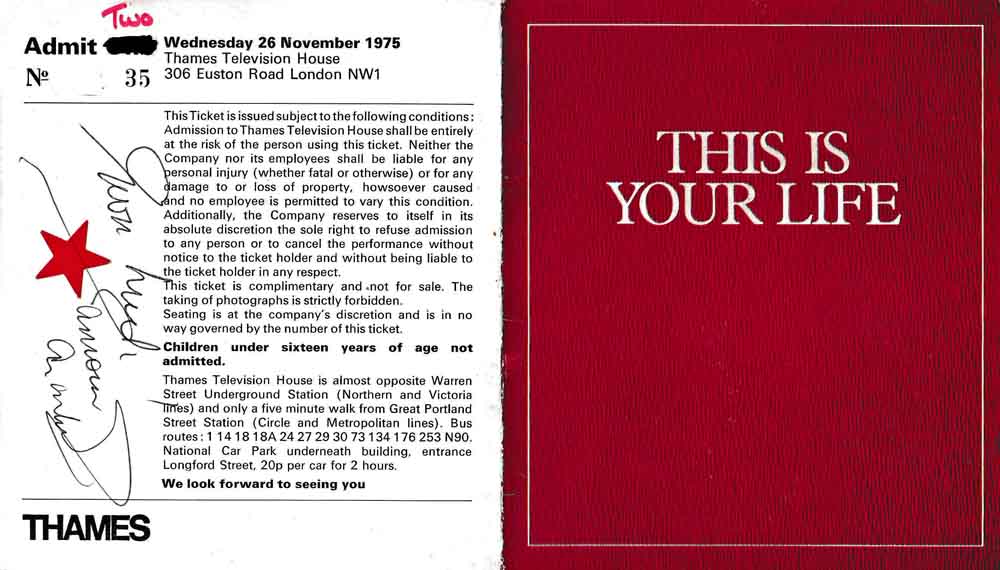Big Red Book
Celebrating television's This Is Your Life
Magnus PYKE (1908-1992)

THIS IS YOUR LIFE - Magnus Pyke, scientist, writer and presenter, was surprised by Eamonn Andrews during a discotheque at the central London headquarters of the National Association of Youth Clubs, where he had been asked to explain the science behind stereophonic sound.
Magnus, who was born in London and educated at St Paul's School, studied agriculture at McGill University in Montreal, Canada, before returning to London in 1934 to work as a research scientist in nutrition. After completing his PhD thesis at University College London in 1938, he studied the nutritional effects of food restrictions due to wartime shortages for the Ministry of Food during the Second World War.
His early talks about science and technology on BBC radio led to television appearances as a regular presenter on Yorkshire Television's science programme Don't Ask Me from 1974. His exuberant delivery, with animated and passionate speech and gesticulation, made him a household name, and he was awarded the Pye Colour Television Award as the most promising male newcomer to television in 1975.
"Really? I'll never trust you again!"
programme details...
- Edition No: 419
- Subject No: 416
- Broadcast date: Wed 10 Dec 1975
- Broadcast time: 7.00-7.30pm
- Recorded: Wed 26 Nov 1975
- Venue: Euston Road Studios
- Series: 16
- Edition: 5
- Code name: Fish
on the guest list...
- Jimmy Savile
- Dorothea - wife
- John - son
- Bessie - daughter
- Miriam Stoppard
- David Bellamy
- Prof Hughes Gounelle
- Herbert Joseph
- Isabel - sister
- Ruth - sister
- Annette Wolfe
- George Harris
- Douglas Atwater
- Madeleine Duke
- Andrew Cairns
- William - grandson
- Robert - grandson
- The Alloa Amateur Orchestra
- members of the Burns Club - in the audience Filmed tribute:
- Russell Herdman
related appearances...
- Mike Yarwood - May 1978
- Barbara Kelly - Nov 1978
- David Bellamy - Dec 1978
- Rob Buckman - Nov 1981
production team...
- Researcher: Lavinia Warner
- Writer: John Sandilands
- Director: Mike Dormer
- Producer: Jack Crawshaw
- names above in bold indicate subjects of This Is Your Life
highlighting the experts
the applause, laughter and tears














Screenshots of Magnus Pyke This Is Your Life and a rare audience ticket from the show's recording

One day in November 1975, I was rung up by Simon Welfare, the producer from Yorkshire Television and a good friend of mine. Could I spare the time to make a 'promo' for one of our 'Don't Ask Me' programmes which it had been decided to show around Christmas time? A 'promo' is a 30-second bit of television to draw public attention to some future item.
The idea was – so Simon told me – to stage it in Jimmy Savile's discotheque for handicapped children where I would explain the operation of a stereophonic record.
This in due course I was doing at about 6.30pm when the lights were suddenly turned up and I found myself captured by Eamonn Andrews, a doyen of television, who for years had been the presenter of the programme, This Is Your Life. So far as I was concerned, the whole thing, so flattering indeed to one's ego, had been organised with the profoundest secrecy. Simon Welfare, for example, after having been sworn to secrecy, was at his special request given a special dispensation allowing him to divulge to Paul Fox, a lofty Director of Yorkshire Television, and only to Paul Fox, what he was doing for fear that if otherwise he were detected going into Thames Television surreptitiously it might be thought that he was betraying his employers.
When in some splendour I arrived to the cheers of the audience in these same studios, I was greeted, one after the other, by Dorothea, by my son John with his wife and their two boys flown down from Scotland, by my daughter Bessie, my two sisters, Isabel and Ruth, my old colleagues from the wartime Home Guard, by a good friend from Paris and some-time nutritional adviser to the French Commission in Germany, Professor Hughes Gounelle (who with his Gallic charm stole the show), a girl from Vienna (whom I was, in fact, unable to recall, although I hope that I managed to hide the fact), by a pre-World War I playmate whom I remember as being a bore when he was a child and who, in his 15-second speech, demonstrated that he was still a bore sixty years later, and by half the members of the Alloa Burns Club, of which I had been a member in Scotland. It was a splendid occasion. Everyone said nice things just as they do at one's funeral. Yet there was no occasion for me to die; quite the contrary.
I heard later that the members of the Burns Club (who brought a bottle or two of the wine of Scotland with them) enjoyed themselves immensely and, when they were eventually corralled, one next to the other all along the line of sleeping compartments of the overnight train from Euston to Stirling, showed a disinclination to stay 'each in his narrow compartment forever laid', as Gray might have put in his elegy, and there was some tendency for them to run up and down the train visiting each other and singing. However, things were said to have quietened down by Carlisle.

Dr Magnus Pyke was voted television's outstanding newcomer after becoming a smash hit on Yorkshire Television's top-rating science programme, "Don't Ask Me".
His brilliance as a scientist, author and lecturer had won him international acclaim. London-born, he had emigrated to Canada on a £3 one-way passage to study at the famous McGill University, where he won the Governor General's medal for the best student of the year. He returned to London to work as a research scientist in nutrition and when war broke out his expertise made him a natural choice to play a leading role in the fight against starvation.
In the post war years Magnus became Chief Executive of the British Association, one of the top scientific jobs in the country. And when he burst on to our television screens he enthralled millions of viewers with the simple and amusing way he went about explaining some of the most complicated of scientific phenomena.
To all who watched his amazing screen cavortings he was a lovable mad genius. So how do you surprise a mad genius? First, I suppose, find another one.
Fortunately we are blessed with some mad geniuses of our own on the This Is Your Life team. And one of them suggested calling in Jimmy Savile, to help. Roy Bottomley pointed out that since Magnus was already a hit with young people we might get Jimmy to invite him to appear in front of an audience of teenagers at a discotheque.
What if Jimmy asked Magnus along to explain to the kids the magic of stereophonic sound?
While he was on stage, Jimmy could play in a record which we would have specially recorded to include a sentence announcing that I was standing behind them. The reaction around the conference was unanimous. "Bought" was the cry as everyone got up from the table to break for lunch. Everyone that is, except Royston Mayoh. As director he was our "Mr Technical Genius" who had to make it all work.
And in typical style he put his heart and soul into it – soul being the operative word. For "soul" was the kind of music he thought best to use on what he hoped was going to be a show-stopping disc.
Having chosen the backing music, Royston now needed some words. And someone to sing them. There was no time to start staging auditions for a new edition of his old programme, Opportunity Knocks, so Royston, whose imagination knows no bounds, put pen to paper then disappeared to a recording booth.
Magnus accepted Jimmy Savile's invitation to appear with him at the disco set up at the National Association of Youth Clubs headquarters in London, and as we drove down Devonshire Street on the appointed night I knew that inside the club Royston's "latest single" would be hidden in Jimmy's collection close to the turntable.
The only way into the club was through the well-lit front entrance and down a flight of steps into a room, specially sealed off from the disco. But before we dared get out of the car we needed a pre-arranged signal to tell us all was clear. As we parked up the street one hundred yards away there was no one there to give it.
First, our driver Harry left the car and hurried off into the dark and drizzly November night to see what the problem was - promising he would be back in two minutes. He wasn't. Then Jack went off to look for him. He didn't come back either. What the hell had happened?
I just had to get out of the car and look for Jack, who was looking for Harry, who was looking for our contact. Fortunately all four of us met in the dark just a few yards from the door and I was more than relieved to hear from Jack that a "technical hold up" had been solved and Magnus was on stage.
We had forty five seconds to get to a pre-arranged spot back-set to have a quick word with Jimmy before making the "hit" with the "hit". Jimmy went back on stage and from my hiding place I could hear him calling to Magnus as he faded down a heavy rock record. He then asked Magnus to turn DJ and place the next record on the turntable, telling him to listen very carefully to the words.
The music started and a deep and dramatic voice (I suspect it was Royston Mayoh himself, but he won't admit it), backed by some dark brown soul began to belt out these words:
"It's a chart-bound sound,
It's a sound you'll like.
We'll lay it on you Dr Magnus Pyke.
Look over your shoulder,
What do you say man?
Yes, dear Magnus
It's Uncle Eamonn.
Eamonn Andrews is standing there..."

And I was. Right there behind him when Jimmy turned him around. Probably for the first time in his life the scientist who talks at at least 150 revs a minute was speechless.
After leaving the disco, Dr Pyke got his breath back to demonstrate more musical expertise. A solo performance on his favourite instrument, the clarinet.

Series 16 subjects
Ronnie Dukes | Ray Milland | Mike Hailwood | Frank Windsor | Magnus Pyke | Bill Tidy | Gladys Mills | Andy StewartWindsor Davies | Ray Reardon | Patrick Mower | Alberto Remedios | Susan Masham | Betty Driver | Henry Davies
Gwen Berryman | Vince Hill | Arnold Ridley | Beryl Reid | Alan Mullery | Percy Thrower | Gareth Edwards
June Whitfield | Terry Fincher | Richard Dunn | Norman Croucher